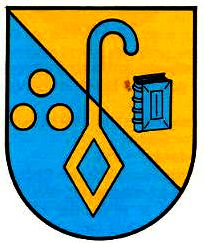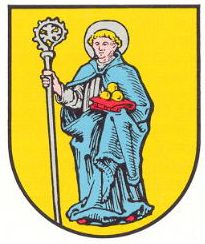Neuhofen (Pfalz): Difference between revisions
Jump to navigation
Jump to search
Knorrepoes (talk | contribs) m (Text replacement - "{| class="wikitable"↵|+Official blazon↵|-↵|'''German'''↵| ↵|-↵|'''English''' ↵| {{blazon wanted}}↵|}" to "{| class="wikitable" |+Official blazon |- |'''German''' | blazon wanted |- |'''English''' | blazon wanted |}") |
Knorrepoes (talk | contribs) m (Text replacement - "↵{{de1}}↵{{media1}}↵↵'''Literature''': Debus, 1988↵↵[[Category:German" to " '''Literature''': Debus, 1988 {{de1}} {{media1}} [[Category:German") |
||
| Line 27: | Line 27: | ||
The old arms are based on the seal of the village, known since 1721, which showed the local patron saint, St. Nicholas. The village council, however, wanted to have a more simplified design, preferably with the old village symbol, which resembled a crosier and which was used on border stones for centuries. The final arms combined this symbol with the book and stones for St. Nicholas. The colours, which were adopted in the 19<sup>th</sup> century were not changed. | The old arms are based on the seal of the village, known since 1721, which showed the local patron saint, St. Nicholas. The village council, however, wanted to have a more simplified design, preferably with the old village symbol, which resembled a crosier and which was used on border stones for centuries. The final arms combined this symbol with the book and stones for St. Nicholas. The colours, which were adopted in the 19<sup>th</sup> century were not changed. | ||
[[Civic Heraldry Literature - Germany|'''Literature''']]: Debus, 1988 | |||
{{de1}} | {{de1}} | ||
{{media1}} | {{media1}} | ||
[[Category:German Municipalities N]] | [[Category:German Municipalities N]] | ||
Revision as of 09:18, 21 July 2023
NEUHOFEN
State : Rheinland-Pfalz
District (Kreis) : Rhein-Pfalz Kreis
Verbandsgemeinde : since 2014 Verbandsgemeinde Waldsee
| German | blazon wanted |
| English | blazon wanted |
Origin/meaning
The arms were granted on October 13, 1976.
Previously the village used the arms above left, which were never officially granted.
The old arms are based on the seal of the village, known since 1721, which showed the local patron saint, St. Nicholas. The village council, however, wanted to have a more simplified design, preferably with the old village symbol, which resembled a crosier and which was used on border stones for centuries. The final arms combined this symbol with the book and stones for St. Nicholas. The colours, which were adopted in the 19th century were not changed.
Literature: Debus, 1988

